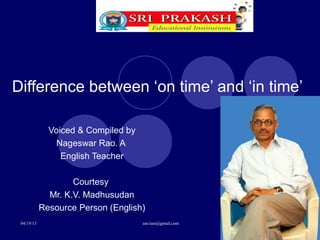Difference between 'on time' and 'in time'
•Download as PPT, PDF•
1 like•219 views
Report
Share
Report
Share

Recommended
Recommended
Joost BROUWER "Are the most valuable resources in drylands areas wetlands?"

Joost BROUWER "Are the most valuable resources in drylands areas wetlands?"Global Risk Forum GRFDavos
More Related Content
Viewers also liked
Joost BROUWER "Are the most valuable resources in drylands areas wetlands?"

Joost BROUWER "Are the most valuable resources in drylands areas wetlands?"Global Risk Forum GRFDavos
Viewers also liked (11)
Welcome to International Journal of Engineering Research and Development (IJERD)

Welcome to International Journal of Engineering Research and Development (IJERD)
Joost BROUWER "Are the most valuable resources in drylands areas wetlands?"

Joost BROUWER "Are the most valuable resources in drylands areas wetlands?"
Welcome to International Journal of Engineering Research and Development (IJERD)

Welcome to International Journal of Engineering Research and Development (IJERD)
More from Sri Prakash Vidya Niketan
More from Sri Prakash Vidya Niketan (20)
ఏ ఏ సందర్బాలలో ఇంగ్లీష్ లో ‘Say’ ‘tell’ ఉపయోగించాలి.

ఏ ఏ సందర్బాలలో ఇంగ్లీష్ లో ‘Say’ ‘tell’ ఉపయోగించాలి.
Difference between 'on time' and 'in time'
- 1. Difference between ‘on time’ and ‘in time’ Voiced & Compiled by Nageswar Rao. A English Teacher Courtesy Mr. K.V. Madhusudan Resource Person (English) 04/19/13 anr.tuni@gmail.com
- 2. At times, we confuse in the usage of ‘on time’ and ‘in time’. Now let us try to comprehend the meaning of the above two phrases correctly. ‘On time’ means ‘exactly at the appointed time’. In other words, if we have to reach our school at 8.30 a.m. and we go exactly at 8.30 a.m. Then we say that we have come ‘on time’. ‘In time’ means we reach our school a few minutes before 8.30 a.m. then we say that we have come ‘in time’. Our principal attended the meeting on time. The guests came on time. You must attend the interview in time. Please go to the railway station in time. 04/19/13 anr.tuni@gmail.com
- 3. Visit us at “ayalasomayajula nageswar rao” For More videos on Functional & Usage Grammar. Subscribe to our channel on You Tube 04/19/13 anr.tuni@gmail.com
